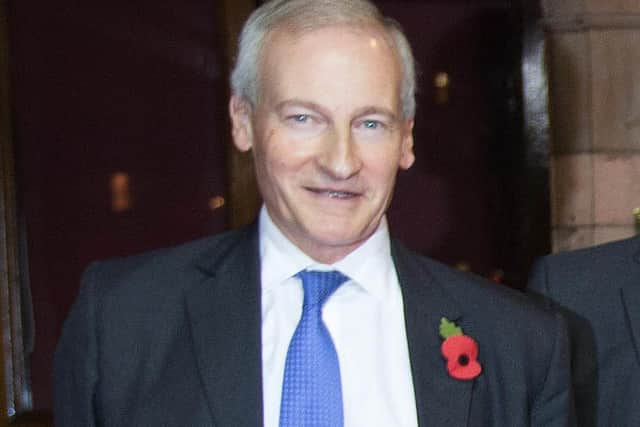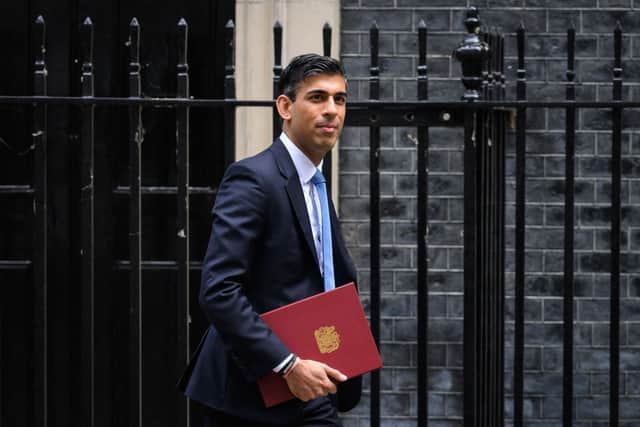Who is Sir Laurie Magnus? Rishi Sunak appoints new ethics advisor but faces criticism over ‘rotten regime’
and live on Freeview channel 276
Rishi Sunak has appointed Sir Laurie Magnus as the government’s new ethics advisor, Downing Street has said.
The role has been vacant for the past six months, meaning the Prime Minister has been facing increasing pressure to find a replacement. While his predecessor Liz Truss said she would not appoint anyone to the role, Sunak insisted it was one of his priorities when he took office in October - promising to bring “integrity, professionalism and accountability” to Number 10.
Advertisement
Hide AdAdvertisement
Hide AdLike many government roles, there has been a lot of turnover when it comes to the ethics advisor. Lord Geidt, the previous holder of the role, quit in June following a turbulent tenure under Boris Johnson. Sir Alex Allan, who held the role until 2020, resigned after Johnson overruled him over a report into alleged bullying by Home Secretary Priti Patel.
But despite finding a successor, Sunak is still facing criticism for choosing to maintain the power to veto investigations into ministers. This comes after the Committee on Standards in Public Life called for the advisor to have the power to start their own investigations without permission from the Prime Minister.
But Sunak has kept hold of this power and will have the final say over whether or not his ministers have broken the code. So who is Sir Laurie Magnus, what is the reaction to his appointment, and why is Sunak being criticised? Here’s everything you need to know.


Who is Sir Laurie Magnus?
Sir Laurie Magnus is the former chairman of Historic England, then known as English Heritage. During the coronavirus pandemic, he sat on the board of the government’s Culture Recovery Fund, which was set up to help cultural bodies impacted by Covid-19, and in 2022, he was awarded a CBE for services to heritage by the late Queen Elizabeth II in her New Year’s Honours list.
Advertisement
Hide AdAdvertisement
Hide AdThe BBC has called Sir Laurie a “veteran banker”, as he worked in the financial services for 40 years and is listed as a senior advisor at investment banking group Evercore.
What has the reaction been?
Sir Laurie has welcomed his new role, which he will take up for a non-renewable five-year term, as an “honour” and significant responsibility. He also said an early priority will be scrutinising the declaration of ministers’ interests.
Writing to the Prime Minister, Sir Laurie said: “I will endeavour to discharge the important responsibilities of the role with fairness and integrity, in a manner which inspires the confidence of ministers, Parliament and the public.”
Meanwhile, in a letter to Sir Laurie, Sunak said: “I have sought to identify potential candidates who can demonstrate the critical qualities of integrity and independence, relevant expertise and experience, and an ability to command the trust and confidence of ministers. Having discussed the role with you, I am confident that you not only demonstrate these qualities but that you will serve in the role with distinction, in the best traditions of public service.”
Advertisement
Hide AdAdvertisement
Hide AdHowever, policy watchers at the Institute for Government said it was “unwise” for Sir Laurie to accept the role without a strengthened remit - without having the power to investigate ministers without the permission of the Prime Minister, effectively.


Why is Rishi Sunak being criticised?
Sunak has been criticised for not changing the way the role works. Deputy Labour leader Angela Rayner criticised the PM for “months of dither and delay” in choosing an advisor and slammed him for “preserving the rotten ethics regime he inherited from his predecessors that saw the previous two ethics watchdogs walk out.”
She continued: “By ignoring the Committee on Standards in Public Life and refusing to grant his ethics advisor genuine independence, this weak Prime Minister is failing to deliver the integrity he promised and instead has installed yet another toothless watchdog.”
Institute for Government director Dr Hannah White said it was “disappointing” that Sunak has “forgone the opportunity to strengthen the role”, while, Dave Penman, the general secretary of the FDA union representing senior civil servants, argued the Prime Minister is “essentially continuity Boris Johnson when it comes to the ministerial code and ministerial conduct”.
Advertisement
Hide AdAdvertisement
Hide AdHe commented: “The Prime Minister retains a veto over investigations into his minister’s conduct and is the sole arbiter of the Ministerial Code, including any sanctions. How will this give civil servants the confidence to come forward?”
The lack of an ethics chief meant that the Prime Minister had to appoint an “independent” investigator to examine the complaints made against Justice Secretary Dominic Raab. Sir Laurie will not be taking over the investigation.
Comment Guidelines
National World encourages reader discussion on our stories. User feedback, insights and back-and-forth exchanges add a rich layer of context to reporting. Please review our Community Guidelines before commenting.
